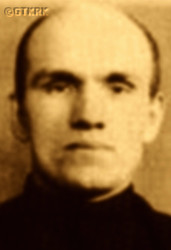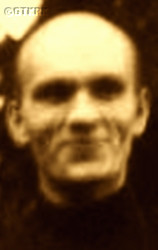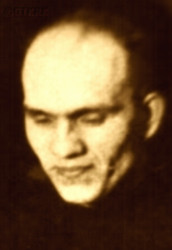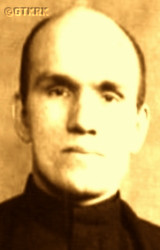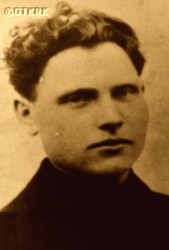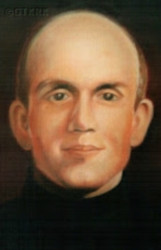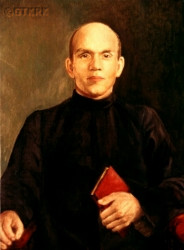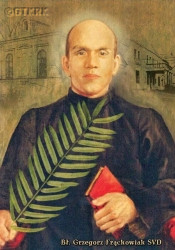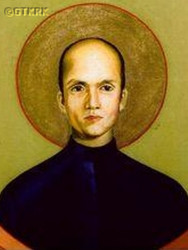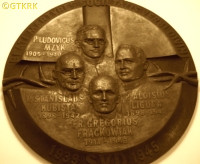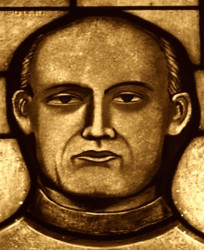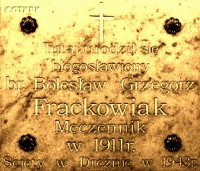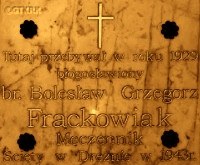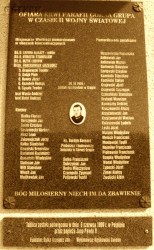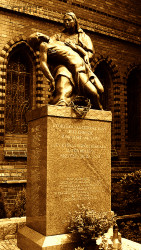Roman Catholic
St Sigismund parish
05-507 Słomczyn
85 Wiślana Str.
Konstancin deanery
Warsaw archdiocese, Poland
full list:
displayClick to display full list

searchClick to search full list by categories
wyświetlKliknij by wyświetlić pełną listę po polsku

szukajKliknij by przeszukać listę wg kategorii po polsku

Martyrology of the clergy — Poland
XX century (1914 – 1989)
personal data
religious status
blessed
surname
FRĄCKOWIAK
forename(s)
Boleslav (pl. Bolesław)
religious forename(s)
Gregory (pl. Grzegorz)
beatification date
13.06.1999more on
www.swzygmunt.knc.pl
[access: 2013.05.19]

the RC Pope John Paul IImore on
en.wikipedia.org
[access: 2014.09.21]
function
laybrother
creed
Latin (Roman Catholic) Church RCmore on
en.wikipedia.org
[access: 2014.09.21]
congregation
Society of the Divine Word (i.e. Verbite Fathers) SVDmore on
en.wikipedia.org
[access: 2013.05.19]
(i.e. Verbites, Divine Word Missionaries, Steyler Missionaries)
date and place
of death
05.05.1943

Dresdentoday: Saxony state, Germany
more on
en.wikipedia.org
[access: 2022.08.05]
details of death
After German and Russian invasion of Poland in 09.1939 and start of the World War II, after start of German occupation, interned by the Germans on 27.10.1939 at his Górna Grupa monastery.
On 05.02.1940 after removal of all priests forced to leave Górna Grupa monastery.
Returned to Poznań where helped at St Martin church sacristy.
Next to moved back to his family Łowęcice.
There apart from working physically as a farm hand helped at catechesis of the children and their preparation to the 1st Communion in Exaltation of the Holy Cross in Cerekwica, St Adalbert in Rusko and Holy Trinity in Nosków parishes left vacant by their arrested parish priests.
After 06.10.1941, when hundreds of Polish priests were arrested as part of the action to eliminate the Polish Catholic clergy in the Germ. Reichsgau Wartheland province, established in the occupied Greater Poland region, forced to work as a bookbinder in Jarocin.
There for some time helped to distribute leaflets of a resistance „For You Poland” organization (part of Polish Clandestine State).
At the same time served to baptize children at local, left vacant after arrests of Polish priests parishes.
On 09.09.1942 after receiving information of the arrests of „For You Poland” members reported to the Gestapo station in Jarocin and accepted „all responsibility”.
Was promptly arrested.
Jailed in Jarocin and Środa Wlkp.
prisons.
Next transported to KL Posen German concentration camp.
Interrogated at Młyńska Str. Gestapo station in Poznań.
Tortured.
Did not reveal anything.
Next moved to Zwickau prison and finally to Dresden.
There on 30.03.1943 sentenced to death at a out–session of the German Oberlandesgericht KL Posen kangaroo court.
Beheaded on the guillotine at Dresden prison.
cause of death
beheading
perpetrators
Germans
sites and events
DresdenClick to display the description, KL Zwickau / Schloß OstersteinClick to display the description, UH PosenClick to display the description, KL PosenClick to display the description, 06.10.1941 arrests (Warthegau)Click to display the description, 26.08.1940 arrests (Warthegau)Click to display the description, Reichsgau WarthelandClick to display the description, DL Ober GruppeClick to display the description, «Intelligenzaktion»Click to display the description, Reichsgau Danzig‐WestpreußenClick to display the description, Ribbentrop‐MolotovClick to display the description, Pius XI's encyclicalsClick to display the description
date and place
of birth
18.07.1911Birth certification on:
photos.szukajwarchiwach.gov.pl
[access: 2025.03.07]

Łowęcicetoday: Jaraczewo gm., Jarocin pov., Greater Poland voiv., Poland
more on
en.wikipedia.org
[access: 2021.12.18]
parents
FRĄCKOWIAK Andrew
🞲 ?, ? — 🕆 ?, ?

PŁOŃCZAK Sophia
🞲 ?, ? — 🕆 ?, ?
baptism
25.07.1911Birth certification on:
photos.szukajwarchiwach.gov.pl
[access: 2025.03.07]

Cerekwicatoday: Cerekwica Stara, Jaraczewo gm., Jarocin pov., Greater Poland voiv., Poland
more on
en.wikipedia.org
[access: 2021.06.20]
St James the Great the Apostle RC church
religious vows
08.09.1932 (temporary)
08.09.1938 (permanent)
positions held
1932 – 1940
friar — Górna Grupatoday: Dragacz gm., Świecie pov., Kuyavia‐Pomerania voiv., Poland
more on
en.wikipedia.org
[access: 2021.09.02] ⋄ St Joseph Missionhouse, Verbites SVD — printer, bookbinder, assistant in the sacristy, kitchen, at the gate
08.09.1930 – 1932
novitiate — Górna Grupatoday: Dragacz gm., Świecie pov., Kuyavia‐Pomerania voiv., Poland
more on
en.wikipedia.org
[access: 2021.09.02] ⋄ St Joseph Missionhouse, Verbites SVD
16.09.1929 – 1930
postulate — Górna Grupatoday: Dragacz gm., Świecie pov., Kuyavia‐Pomerania voiv., Poland
more on
en.wikipedia.org
[access: 2021.09.02] ⋄ St Joseph Missionhouse, Verbites SVD
1929
pupil — Bruczkówtoday: Borek Wielkopolski gm., Gostyń pov., Greater Poland voiv., Poland
more on
en.wikipedia.org
[access: 2021.12.18] ⋄ Sacred Heart of Jesus Missionhouse, Verbites SVD
sites and events
descriptions
Dresden: Harsh German prison at Münchner Platz 3 in Dresden where Germans conducted executions of German „citizens” sentenced to death during World War II. Altogether c. 1,386 people were guillotined there, among them many Poles accused of treason against German state.
KL Zwickau / Schloß Osterstein: A heavy German prison in Zwickau in Saxony, founded in 1770‐1775 at the Schloß Osterstein castle. In the XIX c., among its detainees were Karl May, August Bebel, Rosa Luxemburg. During World War II, prob. had the status of Germ. Konzentrationslager (Eng. concentration camp) KL Zwickau / Schloß Osterstein and political prisoners were held there under an extralegal system, euphemistically known as the German Schutzhaft (Eng. protective custody). Prisoners, living in overcrowded cells, slave laboured in the city receiving starvation rations. (more on: en.wikipedia.orgClick to attempt to display webpage
[access: 2010.08.11])
UH Posen: Germ. Untersuchungshaftanstalt Posen (Eng. Poznań Detention Centre), run by the Germ. Geheime Staatspolizei (Eng. Secret State Police), i.e. Gestapo, at 1 Młyńska Str. in Poznań. Death sentences by guillotine and hanging were also carried out there — in total, during World War II, the Germans are said to have murdered at least 1,639 people there (1,532 men, 93 women and 14 children — people under the age of 18), including c. 1,400 people who were probably killed by guillotine. Convicts in custody were greeted: Germ. „Wir werden auch mit dir fertig sein — Kopf herunter” (Eng. „We will finish you too — keep your head down”). Sentences were usually carried out on Tuesdays and Fridays, around on 06:00. According to the testimony of one of the German executioners: „Two assistants took the condemned by the arms and led him to a bench, where they laid him face down. The head stuck out above the bathtub. A special board pressed the condemned man's neck. At the prosecutor's call, the executioner dropped a knife weighing 2–3 hundredweight. The severed head fell into the bathtub”. (more on: pl.wikipedia.orgClick to attempt to display webpage
[access: 2013.10.05])
KL Posen: German Posen — Fort VII — camp founded in c. 10.10.1939 in Poznań till mid of 11.1939 operated formally as Germ. Konzentrationslager (Eng. concentration camp) KL Posen, and this term is used throughout the White Book, also later periods. It was first such a concentration camp set up by the Germans on Polish territory — in case of Greater Poland (Wielkopolska) directly incorporated into German Reich. In 10.1939 in KL Posen for the first time Germans used gas to murder civilian population, in particular patients of local psychiatric hospitals. From 11.1939 the camp operated as German political police Gestapo prison and transit camp (Germ. Übergangslager), prior to sending off to concentration camps, such as KL Dachau or KL Auschwitz. In 28.05.1941 the camp was rebranded as police jail and slave labour corrective camp (Germ. Arbeitserziehungslager). At its peak up to 7‐9 executions were carried in the camp per day, there were mass hangings of the prisoners and some of them were led out to be murdered elsewhere, outside of the camp. Altogether in KL Posen Germans exterminated approx. 20,000 inhabitants of Greater Poland (Wielkopolska) region, including many representatives of Polish intelligentsia, patients and staff of psychiatric hospitals and dozen or so Polish priests. Hundreds of priests were held there temporarily prior to transport to other concentration camps, mainly KL Dachau. From 03.1943 the camp had been transformed into an industrial complex (from 25.04.1944 — Telefunken factory manufacturing radios for submarines and aircrafts). (more on: www.wmn.poznan.plClick to attempt to display webpage
[access: 2019.02.02], en.wikipedia.orgClick to attempt to display webpage
[access: 2013.12.27])
06.10.1941 arrests (Warthegau): On 13.09.1941 Germ. Gauleiter (Eng. regional leader) of German province Germ. Reichsgau Wartheland (Eng. Wartheland Reich district), in German‐occupied Greater Poland (where German standard law was in force), Artur Greiser, implementing „Ohne Gott, ohne Religion, ohne Priesters und Sakramenten” — „without God, without religion, without priest and sacrament” — policy issued a decree formally dissolving Catholic Church and forming in its place a Roman Catholic German National Church in Germ. Warthegau, an organization subject to a German private law. The ordinance was issued backdated to 01.09.1939, i.e. the date of the German invasion of Poland, which sanctioned the later robbery of the property of the Catholic Church acting for the benefit of the Polish population by the Germans. All the contacts with Vatican were forbidden. All the religion congregations were also dissolved. Soon after, on 06‐07.10.1941, mass arrests of Polish Catholic priests took place — c. 352 were detained. All were herded into DL Konstantinow in Konstantynów or IL Lond in Ląd on Warta river transit camps or KL Posen concentration camp (in this case, the detainees were first registered, photographed and examined in the infamous Poznań headquarters of the German political police, the Gestapo, in the former Soldier's House). On 30.10.1941 most of them were transported to KL Dachau concentration camp.
26.08.1940 arrests (Warthegau): As part of the Germ. „Ohne Gott, ohne Religion, ohne Priesters und Sakramenten” (Eng. „without God, without religion, without priest and sacrament”) policy, formulated by the Germ. Gauleiter (Eng. district head), Arthur Greiser, in the German province Germ. Reichsgau Wartheland (Eng. Wartheland Reichs District), organized by the Germans in the occupied part of Poland known as Greater Poland, hundreds of Polish priests were arrested on this day. Herded, together with priests arrested previously and held in IL Lond internment camp in Ląd on Warta river camp, among others, in DL Scheglin transit camp in Szczeglin n. Mogilno. Three days later all were transferred to KL Sachsenhausen concentration camp.
Reichsgau Wartheland: After the Polish defeat in the 09.1939 campaign, which was the result of the Ribbentrop‐Molotov Pact and constituted the first stage of World War II, and the beginning of German occupation in part of Poland (in the other, eastern part of Poland, the Russian occupation began), the Germans divided the occupied Polish territory into five main regions (and a few smaller). The largest one was transformed into Germ. Generalgouvernement (Eng. General Governorate), intended exclusively for Poles and Jews and constituting part of the so‐called Germ. Großdeutschland (Eng. Greater Germany). Two were added to existing German provinces. From two other separate new provinces were created. Greater Poland region was one of them, incorporated into Germany on 08.10.1939, by decree of the German leader Adolf Hitler (formally came into force on 26.10.1939), and on 24.01.1940 transformed into the Germ. Reichsgau Wartheland (Eng. Wartheland Reich Province), in which the law of the German state was to apply. The main axis of the policy of the new province, the territory of which the Germans recognized as the Germ. „Ursprünglich Deutsche” (Eng. „natively German”), despite the fact that 90% of its inhabitants were Poles, was Germ. „Entpolonisierung” (Eng. „Depolonisation”), i.e. forced Germanization. C. 100,000 Poles were murdered as part of the Germ. „Intelligenzaktion”, i.e. extermination of Polish intelligentsia and ruling classes. C. 630,000 were forcibly resettled to the Germ. Generalgouvernement, and their place taken by the Germans brought from other areas occupied by Germany (e.g. the Baltic countries, Bessarabia, Bukovina, etc.). Poles were forced to sign the German nationality list, the Germ. Deutsche Volksliste DVL. As part of the policy of „Ohne Gott, ohne Religion, ohne Priesters und Sakramenten” (Eng. „No God, no religion, no priest or sacrament”) most Catholic priests were arrested and sent to concentration camps. All schools teaching in Polish, Polish libraries, theaters and museums were closed. Polish landed estates confiscated. To further reduce the number of the Polish population, Poles were sent to forced labor deep inside Germany, and the legal age of marriage for Poles was increased (25 for women, 28 for men). The German state office, Germ. Rasse‐ und Siedlungshauptamt (Eng. Main Office of Race and Settlement) RuSHA, under the majesty of German law, abducted several thousand children who met specific racial criteria from Polish families and subjected them to forced Germanization, handing them over to German families. After the end of hostilities of World War II, the overseer of this province, the Germ. Reichsstatthalter (Eng. Reich Governor) and the Germ. Gauleiter (Eng. district head) of the German National Socialist Party, Arthur Karl Greiser, was executed. (more on: en.wikipedia.orgClick to attempt to display webpage
[access: 2024.06.21])
DL Ober Gruppe: From 10.1939 till c. 04.1940, in the Divine Word Missionaries SVD Congregation's house in Górna Grupa — taken over by the Germans after the suspension of the activities of the Minor Seminary run by the friars, and their internment, and the repurposing of the building for military purposes — the Germans organized a Germ. Durchgangslager (Eng. Transit camp), i.e. DL Ober Gruppe, for Poles, including 95 Polish clergy, from the Świecie, Bydgoszcz, Chełmno, Grudziądz, and Starogard Gdański regions in Pomerania. C. 50 of them — detained as part of the Germ. «Intelligenzaktion» (Eng. „Action Intelligence”), i.e. the extermination of the Polish intelligentsia and leadership classes in Pomerania — perished, a significant number of them murdered at the execution sites in Mniszek‐Grupa. In the same place in 1945 Russians set up a concentration camp for Germans, among whom two priests perished. (more on: pl.wikipedia.orgClick to attempt to display webpage
[access: 2021.12.19], www.kpbc.ukw.edu.plClick to attempt to display webpage
[access: 2013.12.27])
«Intelligenzaktion»: German: «Intelligenzaktion» (English: „Intelligence Action”) — a German program of extermination of the Polish elite, mainly the intelligentsia and leadership layers, carried out from the beginning of the occupation in w 09.1939 to 04.1940, mainly in territories directly annexed to Germany, but also in the so‐called Germ. Generalgouvernement (Eng. General Governorate), where it was called «AB‐aktion». In the first phase, immediately after the beginning of the German occupation, during military operations carried out by the Germ. Wehrmacht (Eng. Armed Forces) and the genocidal units of the Germ. Einsatzgruppen (Eng. Operational Groups) of the Germ. Sicherheitspolizei (Eng. Security Police), i.e. SiPo, and Germ. Sicherheitsdienst des Reichsführers SS (Eng. Security Service of the Reichsführer SS), i.e. SD, organized by the Germ. Reichssicherheitshauptamt (Eng. Reich Main Security Office), i.e. RSHA, which followed the troops, carried out under the Germ. Unternehmen „Tannenberg” (Eng. Operation „Tannenberg”) — based on the so‐called Germ. Sonderfahndungsliste (Eng. Special Wanted Lists), i.e. proscription lists of Poles considered particularly dangerous to the Third Reich, prepared by the Zentralstelle II/P (Polen) unit of the German RSHA. Later, implemented by the German civilian occupation authorities and the genocidal unit of the Germ. Volksdeutscher Selbstschutz (Eng. Ethnic Germans Self‐Defense), whose members were Germ. Volksdeutsche (Eng. Ethnic Germans), i.e. representatives of the German minority in Poland. According to various sources, these lists, at the beginning of 09.1939, could have contained the details of 61,000—88,000 „dangerous” Poles — although these figures cannot be confirmed. In total, during this genocide, c. 50,000 teachers, Catholic priests, representatives of the landed gentry, freelancers, social and political activists, and retired military personnel were systematically and methodically murdered. Another 50,000 were sent to concentration camps, where only a negligible percentage survived. (more on: en.wikipedia.orgClick to attempt to display webpage
[access: 2014.10.04])
Reichsgau Danzig‐Westpreußen: After the Polish defeat in the 09.1939 campaign, which was the result of the Ribbentrop‐Molotov Pact and constituted the first stage of World War II, and the beginning of German occupation in part of Poland (in the other, eastern part of Poland, the Russian occupation began), the Germans divided the occupied Polish territory into five main regions (and a few smaller). The largest one was transformed into Germ. Generalgouvernement (Eng. General Governorate), intended exclusively for Poles and Jews and constituting part of the so‐called Germ. Großdeutschland (Eng. Greater Germany). Two were added to existing German provinces. From two other separate new provinces were created. Vistula Pomerania region was one of them, incorporated into Germany on 08.10.1939, by decree of the German leader Adolf Hitler (formally came into force on 26.10.1939), and on 02.11.1939 transformed into the Germ. Reichsgau Danzig‐Westpreußen (Eng. Reich District of Gdańsk‐West Prussia) province, in which the law of the German state was to apply. The main axis of the policy of the new province, the territory of which the Germans recognized as the Germ. „Ursprünglich Deutsche” (Eng. „natively German”), despite the fact that 85% of its inhabitants were Poles, was Germ. „Entpolonisierung” (Eng. „Depolonisation”), i.e. forced Germanization. C. 60,000 Poles were murdered in 1939‐1940, as part of the Germ. „Intelligenzaktion”, i.e. extermination of Polish intelligentsia and ruling classes, in c. 432 places of mass executions — including c. 220 Polish Catholic priests. The same number were sent to German concentration camps, from where few returned (over 300 priests were arrested, of whom c. 130 died in concentration camps). C. 124,000‐170,000 were displaced, including c. 90,000 to the Germ. Generalgouvernement. Poles were forced en masse to sign the German nationality list, the Germ. Deutsche Volksliste DVL. Polish children could only learn in German. It was forbidden to use the Polish language during Catholic Holy Masses and during confession. Polish landed estates were confiscated..To further reduce the number of the Polish population, Poles were sent to forced labor deep inside Germany. The remaining Poles were treated as low‐skilled labor, isolated from the Germans and strictly controlled — legally, three or three of them could only meet together, even in their own apartments. Many were conscripted into the German Wehrmacht army. After the end of hostilities of World War II, the overseer of this province, the Germ. Reichsstatthalter (Eng. Reich Governor) and the Germ. Gauleiter (Eng. district head) of the German National Socialist Party, Albert Maria Forster, was executed. (more on: en.wikipedia.orgClick to attempt to display webpage
[access: 2024.06.24])
Ribbentrop‐Molotov: Genocidal Russian‐German alliance pact between Russian leader Joseph Stalin and German leader Adolf Hitler signed on 23.08.1939 in Moscow by respective foreign ministers, Mr. Vyacheslav Molotov for Russia and Joachim von Ribbentrop for Germany. The pact sanctioned and was the direct cause of joint Russian and German invasion of Poland and the outbreak of the World War II in 09.1939. In a political sense, the pact was an attempt to restore the status quo ante before 1914, with one exception, namely the „commercial” exchange of the so‐called „Kingdom of Poland”, which in 1914 was part of the Russian Empire, fore Eastern Galicia (today's western Ukraine), in 1914 belonging to the Austro‐Hungarian Empire. Galicia, including Lviv, was to be taken over by the Russians, the „Kingdom of Poland” — under the name of the General Governorate — Germany. The resultant „war was one of the greatest calamities and dramas of humanity in history, for two atheistic and anti‐Christian ideologies — national and international socialism — rejected God and His fifth Decalogue commandment: Thou shall not kill!” (Abp Stanislav Gądecki, 01.09.2019). The decisions taken — backed up by the betrayal of the formal allies of Poland, France and Germany, which on 12.09.1939, at a joint conference in Abbeville, decided not to provide aid to attacked Poland and not to take military action against Germany (a clear breach of treaty obligations with Poland) — were on 28.09.1939 slightly altered and made more precise when a treaty on „German‐Russian boundaries and friendship” was agreed by the same murderous signatories. One of its findings was establishment of spheres of influence in Central and Eastern Europe and in consequence IV partition of Poland. In one of its secret annexes agreed, that: „the Signatories will not tolerate on its respective territories any Polish propaganda that affects the territory of the other Side. On their respective territories they will suppress all such propaganda and inform each other of the measures taken to accomplish it”. The agreements resulted in a series of meeting between two genocidal organization representing both sides — German Gestapo and Russian NKVD when coordination of efforts to exterminate Polish intelligentsia and Polish leading classes (in Germany called «Intelligenzaktion», in Russia took the form of Katyń massacres) where discussed. Resulted in deaths of hundreds of thousands of Polish intelligentsia, including thousands of priests presented here, and tens of millions of ordinary people,. The results of this Russian‐German pact lasted till 1989 and are still in evidence even today. (more on: en.wikipedia.orgClick to attempt to display webpage
[access: 2015.09.30])
Pius XI's encyclicals: Facing the creation of two totalitarian systems in Europe, which seemed to compete with each other, though there were more similarities than contradictions between them, Pope Pius XI issued in 03.1937 (within 5 days) two encyclicals. In the „Mit brennender Sorge” (Eng. „With Burning Concern”) published on 14.03.1938, condemned the national socialism prevailing in Germany. The Pope wrote: „Whoever, following the old Germanic‐pre‐Christian beliefs, puts various impersonal fate in the place of a personal God, denies the wisdom of God and Providence […], whoever exalts earthly values: race or nation, or state, or state system, representatives of state power or other fundamental values of human society, […] and makes them the highest standard of all values, including religious ones, and idolizes them, this one […] is far from true faith in God and from a worldview corresponding to such faith”. On 19.03.1937, published „Divini Redemptoris” (Eng. „Divine Redeemer”), in which criticized Russian communism, dialectical materialism and the class struggle theory. The Pope wrote: „Communism deprives man of freedom, and therefore the spiritual basis of all life norms. It deprives the human person of all his dignity and any moral support with which he could resist the onslaught of blind passions […] This is the new gospel that Bolshevik and godless communism preaches as a message of salvation and redemption of humanity”… Pius XI demanded that the established human law be subjected to the natural law of God , recommended the implementation of the ideal of a Christian state and society, and called on Catholics to resist. Two years later, National Socialist Germany and Communist Russia came together and started World War II. (more on: www.vatican.vaClick to attempt to display webpage
[access: 2023.05.28], www.vatican.vaClick to attempt to display webpage
[access: 2023.05.28])
sources
personal:
pl.wikipedia.orgClick to attempt to display webpage
[access: 2019.05.30], www.seminarium.org.plClick to attempt to display webpage
[access: 2019.05.30], photos.szukajwarchiwach.gov.plClick to attempt to display webpage
[access: 2025.03.07]
bibliographical:
„A martyrology of Polish clergy under German occupation, 1939‐1945”, Fr Szołdrski Vladislaus CSSR, Rome 1965
original images:
www.werbisci.plClick to attempt to display webpage
[access: 2021.12.19], www.seminarium.org.plClick to attempt to display webpage
[access: 2017.01.21], www.seminarium.org.plClick to attempt to display webpage
[access: 2017.01.21], www.seminarium.org.plClick to attempt to display webpage
[access: 2017.01.21], www.seminarium.org.plClick to attempt to display webpage
[access: 2017.01.21], www.seminarium.org.plClick to attempt to display webpage
[access: 2017.01.21], www.seminarium.org.plClick to attempt to display webpage
[access: 2017.01.21], www.chludowo.werbisci.plClick to attempt to display webpage
[access: 2017.01.21], www.seminarium.org.plClick to attempt to display webpage
[access: 2017.01.21], www.chludowo.werbisci.plClick to attempt to display webpage
[access: 2017.01.21], www.kostuchna.katowice.opoka.org.plClick to attempt to display webpage
[access: 2019.04.16], www.seminarium.org.plClick to attempt to display webpage
[access: 2017.01.21], www.seminarium.org.plClick to attempt to display webpage
[access: 2017.01.21], www.seminarium.org.plClick to attempt to display webpage
[access: 2017.01.21], svdgg.republika.plClick to attempt to display webpage
[access: 2014.03.10], www.szczecin.plClick to attempt to display webpage
[access: 2014.09.21]
LETTER to CUSTODIAN/ADMINISTRATOR
If you have an Email client on your communicator/computer — such as Mozilla Thunderbird, Windows Mail or Microsoft Outlook, described at WikipediaPatrz:
en.wikipedia.org, among others — try the link below, please:
LETTER to CUSTODIAN/ADMINISTRATORClick and try to call your own Email client
If however you do not run such a client or the above link is not active please send an email to the Custodian/Administrator using your account — in your customary email/correspondence engine — at the following address:

giving the following as the subject:
MARTYROLOGY: FRĄCKOWIAK Boleslav
To return to the biography press below:
 Click to return to biography
Click to return to biography








